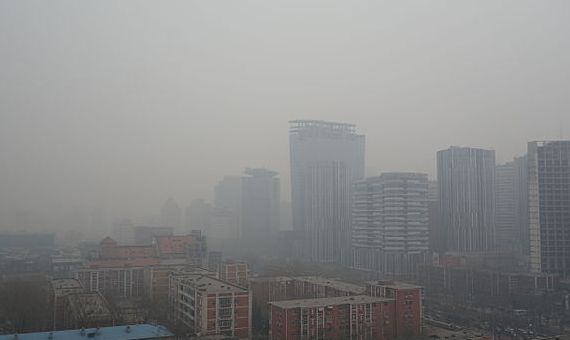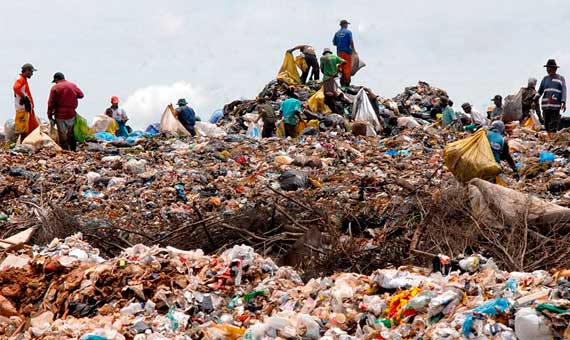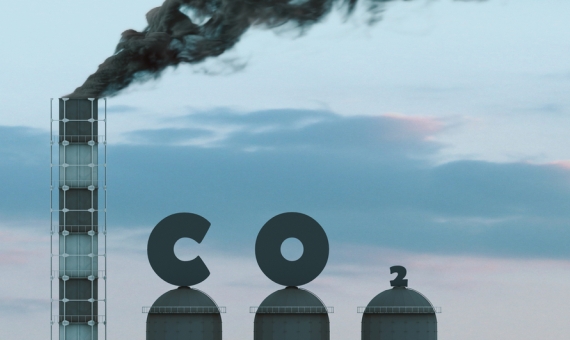To talk only about climate change is nothing short of a dangerous simplification. Whether it is an innocent mistake, a need to ascribe to the prevailing communicative framework or a deliberate decision, discussing climate change contributes to obscuring the consequences, responsibilities and needs of the complex crisis that already articulates our present and threatens to dismember our future: the Eco-social Crisis. But what does this crisis imply and why should we think beyond climate change?
THE OTHER FACES OF THE ECOLOGICAL CRISIS
Climate change is undoubtedly one of the most pressing problems of our time. Not surprisingly, the World Economic Forum classifies climate inaction as a more destructive danger to humanity than the use of weapons of mass destruction1. But we cannot understand it or treat it as an isolated crisis. Climate change is a vector that accelerates and is accelerated by numerous ecological problems: loss of biodiversity and ecosystems, pollution, resource crises, etc., and they are all deeply intertwined. To want to solve one means solving them all. To discuss climate change alone is to ignore its contextualization within the ecological crisis. To talk about climate change is to fail to recognize the five million deaths that, as far back as 2010, the ecological crisis caused as a whole2.

One of the most serious ecological problems is the loss of biodiversity, something so brutal that scientists are already talking about the sixth mass extinction of species. We have multiplied the rate of natural extinction a thousandfold: every day, we lose 150 species 4. Unique forms of life that preceded us. Unique forms of life that have not survived us. This is an ethical disaster because, as Pythagoras once said: “As long as man continues to be a ruthless destroyer of lower living beings, he will never know health and peace. For as long as men massacre animals, they will kill each other.” But beyond ethical considerations, the loss of biodiversity has colossal consequences for the natural balance. Biodiversity endows ecosystems with resilience; without it, ecosystems become fragile and susceptible to collapse at the slightest disturbance. Our societies need living nature: the collapse of ecosystems will be followed by the collapse of our societies. And in a country such as ours, where human activities have reduced the vertebrate population by 75% in fifty years alone5, our ecosystems are not exactly in good health. Our impact on biodiversity is so devastating that, if the human species were to disappear today, it would take the earth 5 to 7 million years to recover the lost biodiversity 6.
The landscape is emptying of life, but it is filling up with waste at such a rate that by 2050 there will be more plastics than fish in the sea 7. Pollution is so magnified, not even that which is unseen is safe: air, the fundamental element of life, is the cause of 7 million deaths out of the total of 9 million deaths that the World Economic Forum estimates pollution causes annually.

The few remaining pristine landscapes will soon become casualties of unbridled extractivism. At present, three quarters of the earth’s surface and two thirds of the oceanic surface are severely affected 8. The ecological situation is unsustainable. We have overstepped our biophysical limits, triggered several tipping points and destabilized the ecological balance. And yet the absence of limits in our system is not synonymous with freedom, but rather with alienation, injustice and profound ignorance. And, despite what we may want to believe, we do not live in isolation from nature.
WHY TALK ABOUT AN ECOSOCIAL CRISIS?
Why talk about an Ecosocial Crisis then? This ecological crisis is rather unnatural. Its causes are anthropogenic: our extractivist and productivist model is the cause of this ecocidal spiral. But the ecological crisis is not only the scene of the disappearance of species, climate disasters or land pollution; it is also the scene of profound human suffering, rising inequality and millions of deaths. Human geography will change radically; it will be between two hundred and fifty thousand and one billion climate refugees by 2050 9, as 1.2 billion people will inhabit non-resilient areas; we are talking about the very impossibility of inhabiting the land that millions of people call home.

We must speak of Ecosocial Crisis because any perspective that does not contemplate the totality of the problem is part of the problem. Moreover, because to speak of Eco-social Crisis is also to emphasize the silenced dimensions of this historical juncture (because it has been going on for a long time and has become a turning point), systemic (because it is a problem of the economic, political and socio-cultural model), translimiting (because we are living beyond the planet’s possibilities), social (because it originates and magnifies inequalities) and transformative (because everything must change in order to dream of a future).
To speak of Ecosocial Crisis is not to regret, it is to understand the complex genesis of this situation. It is to understand how responsibility is distributed inversely proportional to social inequality: while the richest 10% of the world’s population is responsible for 50% of CO2 emissions, the poorest 50% of the world’s population is only responsible for 10% of emissions 10.

To speak of an Eco-social Crisis is to speak of a systemic crisis (not only of the system). Yes, it is true that it is the neoliberal model that has produced the ecological catastrophe we are facing. It is not in vain that 71% of CO2 emissions have been produced by 100 private companies since 1988. But this system has also fostered a complicit social, political and emotional culture. This system needs to be transformed. We must generate a new paradigm where the priority is livability, where human suffering and inequalities are reduced, where the economy is committed to our well-being and to the regeneration of nature. Yes, we must mitigate the Eco-social Crisis right away and make our communities resilient. The reasons for this are not lacking. However, we still need to build a transformative project that generates majorities of change. Hence the need to talk about systemic crisis.

To talk about the Eco-social Crisis is, in short, to unite, without neglecting to draw distinctions. It means reconciling the totality and the singularity of the different crises that make up the Eco-social Crisis. As Marina Garcés points out, no longer are there partial solutions to any of the problems of our time. That is why whenever we talk about ecological justice, we must also talk about social justice. When we talk about green transition, we must also talk about political, economic and social transitions. To talk about Ecosocial Crisis is, in short, to allow ourselves to be captivated by the historical opportunity we are experiencing without forgetting the responsibility we have, because as Kim Stanley Robinson once said: we are the primitives of an unknown civilization.
Alejandro Quecedo del Val
References
- Foro Económico Mundial, The Global Risks Report 2020, World Economic Forum, 2020.
-
Climate Vulnerable Forum, Climate vulnerability monitor: a guide to the cold calculus of a hot planet, DARA, Madrid, 2012
-
de Vos J., Lucas N., Joppa J., Gittleman P., Stephen L., Estimating the normal background rate of species extinction, Conservation Biology 29, 2014.
- Almond R., Grooten M., Petersen T., Informe planeta vivo 2020: revertir la curva de la pérdida de biodiversidad, WWF, Gland, 2020.
-
Matt D., Faurby S., Svenning J., Mammal diversity will take millions of years to recover from the current biodiversity crisis, Proceedings of the National Academy of Sciences 115, no. 44, 2018
-
Lapresa, J. 2050: Más plásticos que peces en los océanos, El País, 2018.
-
Díaz J., Settele E. Brondízio E., Ngo M., Guèze J., Agard A., Arneth P., Balvanera K., Brauman S., Butchart K., Chan L., Garibaldi K., Ichii J., Liu S., Subramanian G., Midgley P., Miloslavich Z., Molnár D., Obura A., Pfaff S., Polasky A., Purvis J., Razzaque B., Reyers R., Roy Chowdhury Y., Shin I., Visseren-Hamakers K., Willis C., Summary for policymakers of the global assessment report on biodiversity and ecosystem services of the Intergovernmental Science-Policy Platform on Biodiversity and Ecosystem Services, IPBES, Bonn, 2019.
-
Ramos Delgado P., Desplazados climáticos: el éxodo forzado por el calentamiento global, Planeta Inteligente, 2018.
-
Oxfam, Extreme carbon inequality. Why the Paris climate deal must put the poorest, lowest emitting and most vulnerable people first, Human Rights Documents Online, 2015
-
Griffin P, Carbon majors report 2017, CPD, 2017.
Comments on this publication